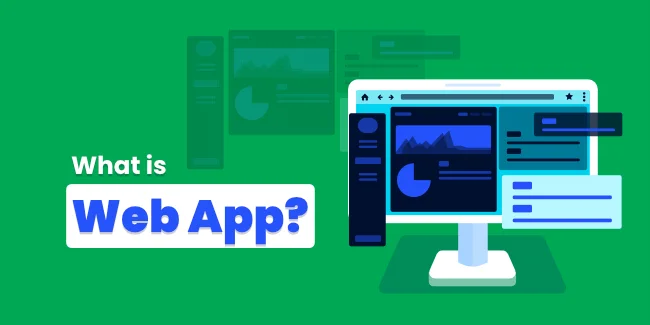webdevelopment
webapp
webapplication
webapps
What is a web application? - A brief tutorial through the topic

The Internet has revolutionized the world so that almost everything we encounter must exist online. Also, businesses looking to sell their products must have a website where users may quickly discover what they need. The website must be clear, understandable, durable, look nice while maintaining functionality. Developing and keeping up with the competition is necessary if you want your company to grow.
One of the ways to make this possible is through web applications. They offer many customization options and provide a lot of security regarding website stability. Our experience as a software development company shows that web development should follow the software development life cycle. Nowadays, websites showcase the company, so you must make every effort to ensure that the final product will be modern, unique, and meet users' expectations. Following trends and using modern solutions such as artificial intelligence must also be carefully thought out and designed.
Therefore, understanding the website development process and what a web application is can help you become aware of its importance in our daily lives.
Web application - what is it?
A web application is software or program that may be accessed via any web browser. The web app has client-side and server-side. The term "client" refers to the program that runs the application. It's part of the client-server paradigm, in which many computers exchange data. Server-side means everything that happens on the webserver instead of on the client.
Businesses must communicate with and conduct transactions with their target consumers using the Internet. The Internet may serve as an excellent and cost-effective mechanism as long as there is a means to collect and store all necessary information and provide users with results. Thanks to web applications, users can interact with businesses through shopping carts or content management systems.
Not only businesses can find use in web apps. Individuals might require it to help them communicate or make online purchases. They are convenient for many customers because Web applications can be used on any operating system: Windows, Linux, Mac, etc. Their usefulness is evident because they all support modern web browsers like Google Chrome, Edge, Mozilla Firefox, or Opera.
Web applications have developed considerably since the moment they were invented. Perl is a popular server-side programming language that was first created in 1987. It was one of the first web apps.
Website and the web app - are they the same?
No, they have similar goals, but their assumptions and principles of operation are different.
For example, the key difference is that the web app does not build the page by itself. It is part of the page. On the other hand, the website is a complete product, which you access with your browser's help.
As we mentioned, the goals may be similar, but their purpose is still slightly different. Web applications are designed for interaction with the user; however, the website mainly consists of static content and is publicly accessible to all visitors.
Another difference between the website and the web app is that the user can view and read the content in the first one, but he cannot execute complicated commands. Still, on the web application, he may not only read the page content but also manipulate the restricted data. It is possible thanks to a specially prepared user interface that is easy to understand.
In our article "Website vs. Web Application - What's The Difference?" we have discussed this issue in detail.
Beware of the common mistakes
It's also important to know that even if it has an "app" in the name, it shouldn't always mean it is the same thing. For example, hybrid apps work similar to a Web app but are installed on the device as a native app. So it can look like a web application, but it's a computer program, so it has nothing to do with web technologies.
What are the benefits of web applications?

There would be no point in using some software if we didn't take advantage of it. It is not the case with web apps, as their functions are well thought out to be convenient for both developers and users.
User Benefits
As a user, customer, you want the website to be easy to use, operated by your device or browser, and not require additional plugins. These requirements are met by most web apps, as they are designed to work on multiple browsers, tablets, smartphones, or any other type of mobile device.
Every new application must be adapted to multiple platforms. Therefore, there are also web applications of popular mobile apps or programs such as Google Docs, Spotify, or web Facebook app. You don't have to download them to your device but use them directly from the browser level.
Web applications are typically known for their versatility and affordability for many needs. Probably every area of life already has its web application. You name it from online retail sales through google apps to mobile apps viewed on web pages.
Developer Benefits
The advantage for the user is also an advantage for the developer because the fact that web applications work on almost all operating systems makes your specialization irrelevant because there will always be a system for which you can create a web application.
The most significant advantage you'll get from it is its price. App development for web applications is relatively cost-effective. It involves connecting a device to an URL with or without links. Development of the native apps, on the other hand, implies a more significant expenditure but has a greater chance of success.
One of the biggest concerns is security, but you don't have to worry about it with web apps. Web application development services include a team of security professionals to monitor your web application server. These can prepare your system for a natural disaster, proactively eliminate data breaches, and keep you online and safe 24/7.
How does the web app work?

Web applications are written in two distinct types of languages. To function, a web application typically combines server-side script and client-side script. The storage and retrieval of data are handled by the server-side script, which uses languages such as Python or Java. The client-side script needs languages like JavaScript, Cascading Style Sheets (CSS), and HTML5. These languages are browser-dependent. That means the browser supports them. The client-side script is responsible for the information's presentation to the user.
Most web applications have short development cycles and can be created by modest teams. Some of the apps need server-side processing. They're known as "dynamic." Some don't necessitate any server-side processing and are therefore static. The web application server performs the requested task – such as querying the database or processing the data – then generates the results of the requested data.
What web apps may I know?
The previously mentioned versatility of web applications is best noticeable when we find out what web applications we have dealt with. I bet you use many of them daily without even knowing it is a web app.
Google Docs
Google Workspace is one of the most popular collections of web applications. It is used to create and automatically save documents collaboratively. It offers the bonus of being used without an internet connection, enabling synching once the connection is established. This web app can be accessed from any device on any operating system. Google workspace apps are also available as mobile app downloads.
Microsoft Office
The Microsoft Office (Word, Excel, Powerpoint, etc.) previously required installation on your PC with saved files on the hard drive. Word, Excel, and PowerPoint are now popular web browser packages for the Microsoft Office Suite that utilizes web apps, and all data are stored on a web server instead of on a hard drive. It works similar to Google Docs, but their web application is not the same version.
Netflix
One of the most important streaming services is also a web app. Netflix illustrates how web apps are ideal as content platforms. And, as with other web apps, it's accessible across devices and operating systems.
Summary
Web applications provide companies and their consumers with more opportunities for interaction. Businesses have started to utilize more web applications due to the growing popularity of the Internet. They are a great way to increase the likelihood of reaching a global market. They are also scientifically easy to use, all we need is a web browser, and we don't need any hard disk to store the data as it is stored on the webserver. Indeed both the customer and the manufacturer will be satisfied with their simplicity and possibilities.
As the best product development company, we pride ourselves on having the best experience and knowledge in the industry, which we love to share with others. If you want to discuss your project with one of our specialists, feel free to schedule a free consultation. We guarantee that you will walk away satisfied!